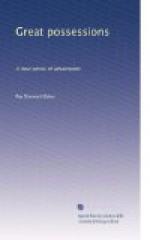The largest and stoniest of the farms is owned by an old man named Howieson. A strange, brown-clad, crooked, crabbed old man, I have seen him often creeping across his fields with his horses. An ineffective worker all his life long, he has scarcely made a living from his stony acres. His farm is tipped up behind upon the hill and runs below to the brook, and the buildings are old and worn, and a rocky road goes by to the town. Once, in more prosperous days, before the factories took over the winter work of these hill farms, the busy families finished shoes, and wove cloth, and plaited straw hats—and one I know was famous for wooden bowls craftily hollowed out of maple knots—and the hill people relied upon their stony fields for little more than their food. But in these later days, the farm industries are gone, the houses are no longer overflowing with children, for there is nothing for children to do, and those who remain are old or discouraged. Some homes have entirely disappeared, so that all that remains is a clump of lilacs or a wild tangle of rose bushes about a grass-covered or bush-grown cellar wall. The last thing to disappear is not that which the old farmers most set their hearts upon, their fine houses and barns or their cultivated fields, but the one touch of beauty they left—lilac clump or rose-tangle.
Old Howieson, with that passion for the sense of possession which thrives best when the realities of possession are slipping away, has posted all his fields with warnings against intrusion. You may not enter this old field, nor walk by this brook, nor climb this hill, for all this belongs, in fee simple, to James Howieson!
[Illustration: No trespass +James Howieson+]
For a long time I did not meet James Howieson face to face, though I had often seen his signs, and always with a curious sense of the futility of them. I did not need to enter his fields, nor climb his hill, nor walk by his brook, but as the springs passed and the autumns whitened into winter, I came into more and more complete possession of all those fields that he so jealously posted. I looked with strange joy upon his hill, saw April blossom in his orchard, and May colour the wild grape leaves along his walls. June I smelled in the sweet vernal of his hay fields, and from the October of his maples and beeches I gathered rich crops and put up no hostile signs of ownership, paid no taxes, worried over no mortgage, and often marvelled that he should be so poor within his posted domain and I so rich without.
One who loves a hill, or a bit of valley, will experiment long until he finds the best spot to take his joy of it; and this is no more than the farmer himself does when he experiments year after year to find the best acres for his potatoes, his corn, his oats, his hay. Intensive cultivation is as important in these wider fields of the spirit as in any other. If I consider the things that I hear and see and smell, and the thoughts that go with them or grow out of them, as really valuable possessions, contributing to the wealth of life, I cannot see why I should not willingly give to them a tenth or a hundredth part of the energy and thought I give to my potatoes or my blackberries or to the writing I do.




